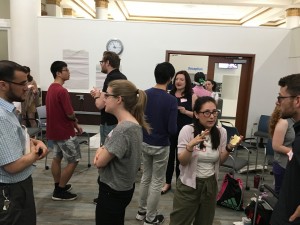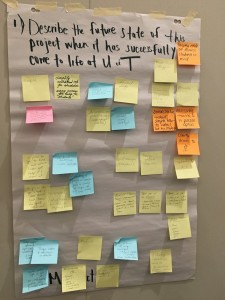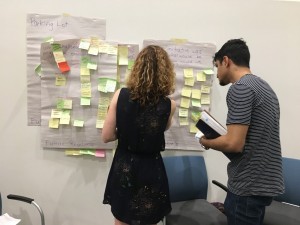By the Innovation Hub’s Knowledge Management Leader Michelle Johnstone, and our Implementation Leader Clara Luca


On June 5th and 9th, the Innovation Hub invited students, faculty, and staff across U of T to offer feedback on our six prototyped project ideas. Toencourage participants to provide direct, meaningful feedback, they were arranged into focus group-like arrangements to ideate and co-create the prototypes which interested them most.

The workshops allowed us to see how the UofT community envisioned each project’s function and future. Each group had a facilitated discussion through a Convergent-Divergent-Convergent framework; the groups spent 10 minutes discussing the question together (convergent), then they broke out and chose a partner from a different group (divergent) to receive feedback and get a new perspective. This lasted for 5 minutes, before everyone converged back into their original group and summarized the points from their divergent conversations in the last 10 minutes.
This Convergent-Divergent-Convergent sequence was repeated for each question, with four in total:
- Describe the future state of this project when it has successfully “come to life” at U of T.
- What challenges and obstacles might be encountered?
- If this initiative was successful, what would be different? How would we measure impact?
- What are three concrete next steps to take to move forward with this project? Who are the appropriate collaborators?
The first workshop took place on the afternoon of Monday June 5th, in the Cumberland Room at the Center for International Experience (CIE). When we arrived, the room was filled with brightly-coloured chairs, set up in rigid rows facing the low stage at the front of the room – we knew that wouldn’t work for the discussion we hoped to have! So we set the chairs up in groups across the room, with the largest group of 13 chairs on the stage – and the tiniest group only 3 chairs!
 In the U of T Concierge focus group, one of the essential factors we agreed upon was an “open door” policy with real people, creating an accessible and accepting place for students to go to have their questions answered, in person and on-campus. An issue we wondered about was how to track the constantly-changing information at U of T, and how to keep our concierges on the same page about available resources available through departments across campus? One of our first steps will be to consult the students for further research, and to approach those who work at front desks across campus, to see how they manage their own constantly-changing resources. The group agreed that expertise from a range of disciplines is needed to ensure this project has a healthy future, where hopefully every student will be able to say, “Oh, yeah, when I need help, I go to the U of T Concierge!
In the U of T Concierge focus group, one of the essential factors we agreed upon was an “open door” policy with real people, creating an accessible and accepting place for students to go to have their questions answered, in person and on-campus. An issue we wondered about was how to track the constantly-changing information at U of T, and how to keep our concierges on the same page about available resources available through departments across campus? One of our first steps will be to consult the students for further research, and to approach those who work at front desks across campus, to see how they manage their own constantly-changing resources. The group agreed that expertise from a range of disciplines is needed to ensure this project has a healthy future, where hopefully every student will be able to say, “Oh, yeah, when I need help, I go to the U of T Concierge!
Similar questions arose in The Knowledge Management Project (KMP) group. The project would undoubtedly require encoding large amounts of information (much of which still lives on U of T departmental sites), we wondered how we would deal with outdated or redundant information…
Although significant obstacles were identified, the group was optimistic about the ways that such a system could empower students to find information on their own, rather than being forced to rely on others to find it for them. One participant connected this empowerment to how being able to find relevant information and connect with the right people significantly impacts how students feel throughout their time at U of T and how well they are able to navigate the challenges they face.

As part of the last question, the groups were asked to come up with (maximum) three concrete next steps. The KMP group suggested something that resonated throughout the groups: the importance of getting the right heads in a room and helping decision makers understand the need for these projects, from a student perspective.
The workshops helped us get our ‘foot in the door’ of many different departments that were interested in the projects. The faculty, staff, and students who showed up were a testament to the multi-departmental investment in these prototypes so far and showed that we are well on our way to opening that door a little wider. Big thanks to everyone who came out!
0 comments on “Ideas Workshop”